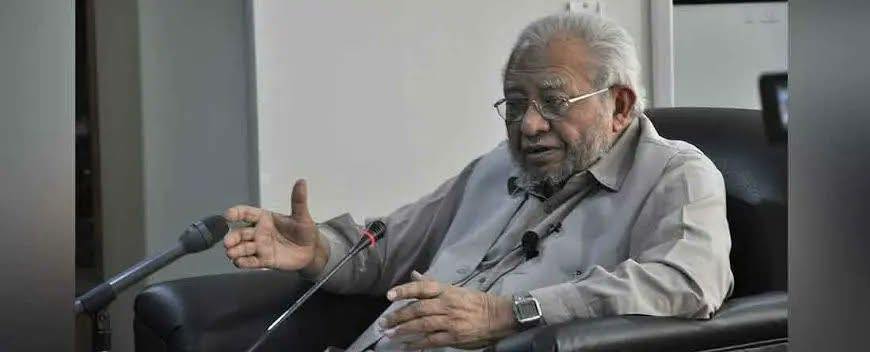Khurshid Ahmad, Renowned Pakistani Economist, Islamic Scholar, and Co-Founder of The Islamic Foundation, Dies at 93
Islamabad, Pakistan — April 2025: The intellectual, academic, and political community in Pakistan and across the Islamic world is mourning the loss of Professor Khurshid Ahmad, a towering figure in Islamic economics, political thought, and education, who passed away at the age of 93. His death marks the end of a remarkable life dedicated to scholarship, reform, and the ideological development of modern Islamic institutions.
Ahmad’s death was confirmed by family members and later acknowledged by national institutions, including the Senate of Pakistan and several academic bodies. He passed peacefully at home surrounded by loved ones. While the cause of death has not been officially disclosed, it is understood that he had been in declining health in recent years due to age-related complications.
A Visionary in Islamic Economics
Born on March 23, 1932, in Delhi, British India, Khurshid Ahmad was a lifelong thinker and reformist whose academic and ideological influence spanned more than six decades. Following the partition of India in 1947, Ahmad’s family migrated to the newly established Pakistan, where he would later become a central figure in the intellectual shaping of the country’s socio-economic thought.
He pursued higher education in economics, completing his master’s degree at the University of Karachi. His academic journey then took him to the University of Leicester in the United Kingdom, where he earned a Master’s in Economics and later, a Ph.D. from the University of Leicester in Islamic economic thought. His studies fused Western economic principles with Islamic ideology—laying the groundwork for his later work as one of the pioneers of Islamic economics, a field that aimed to develop an alternative economic model rooted in Shariah principles.
Ahmad was a key figure in challenging capitalist and socialist paradigms by proposing economic systems based on zakat (alms), prohibition of riba (usury), ethical trade, and distributive justice. His writings inspired generations of scholars across the Muslim world, and his influence can be found in the curricula of Islamic universities, think tanks, and research foundations globally.
Co-Founder of The Islamic Foundation
One of Khurshid Ahmad’s most enduring legacies is his role as the co-founder of The Islamic Foundation in the United Kingdom in 1973. Established in Leicester alongside fellow thinker Khurram Murad, the Foundation became one of the world’s leading centers for Islamic education, publication, and interfaith dialogue. Under Ahmad’s intellectual guidance, the Foundation produced influential works on Islamic economics, philosophy, politics, and social justice.
Through The Islamic Foundation, Ahmad championed the development of Islamic educational materials in English and other languages, helping to bridge the gap between traditional Islamic scholarship and contemporary academic discourse. The Foundation also played a crucial role in introducing Islam to Western audiences in an era where such dialogues were rare and often fraught with misunderstanding.
Political and Public Life
Khurshid Ahmad also held a prominent position in Pakistan’s political landscape. A longtime member of Jamaat-e-Islami, Pakistan’s largest religious political party, he served as a Senator from 2002 to 2006, where he remained committed to the cause of Islamic governance, social justice, and national development rooted in moral values.
As a member of the Senate, he served on several important committees, including those related to education, finance, and religious affairs. Even outside of formal office, Ahmad was widely regarded as a guiding voice in national policy debates, particularly in areas concerning Islamic law, education, and ethics.
His advisory roles included positions in Pakistan’s Planning Commission, where he contributed to economic strategies and policies from an Islamic perspective, often challenging neoliberal models in favor of systems more aligned with local values and Islamic principles.
Academic Contributions and Global Recognition
Ahmad’s scholarly output was prolific. He authored and edited numerous books, articles, and essays in both English and Urdu. His works, including Islam: Its Meaning and Message, Studies in Islamic Economics, and Contemporary Islamic Thought, are considered foundational texts in the fields of Islamic studies and economics.
His contributions were recognized with Pakistan’s highest civil awards, including the Sitara-i-Imtiaz and Nishan-e-Imtiaz, for his services to education and ideology. Internationally, he was invited to speak at universities and conferences across the Middle East, Southeast Asia, Europe, and North America.
Ahmad was also instrumental in mentoring hundreds of young scholars who now serve in universities, think tanks, and policy institutions around the world. He remained a tireless advocate for the integration of Islamic values into modern life, always emphasizing the compatibility of faith and progress.
Tributes and Legacy
Tributes to Khurshid Ahmad have poured in from across the Muslim world. Pakistan’s President and Prime Minister both issued statements honoring his “unwavering commitment to Islamic values and intellectual development.” Leading Islamic scholars, including Yusuf al-Qaradawi (in previous years), Tariq Ramadan, and others, have acknowledged his pioneering work in carving a global path for Islamic economic systems.
Dr. Anis Ahmad, Vice Chancellor of Riphah International University and a longtime colleague, said:
“Professor Khurshid Ahmad was not just a scholar, but a movement in himself. His ideas will continue to resonate for generations to come. He taught us how to think critically while remaining anchored in our tradition.”
He is survived by his wife, children, and grandchildren, many of whom continue his legacy in academic and philanthropic work. Funeral prayers were held at Islamabad’s Faisal Mosque, attended by dignitaries, scholars, students, and admirers from across the country and abroad.
A Towering Intellectual Passes Into History
Khurshid Ahmad was more than an economist or politician—he was a builder of institutions, a voice for ethical governance, and a beacon for Muslims navigating the complexities of modernity with faith and purpose.
His lifelong mission to harmonize Islamic principles with contemporary challenges leaves a blueprint for future generations seeking a just, spiritually rooted society. In an age increasingly shaped by moral uncertainty, Professor Khurshid Ahmad’s legacy stands as a reminder that faith, intellect, and integrity can and must guide the future.
May Allah grant him the highest place in Jannah.

